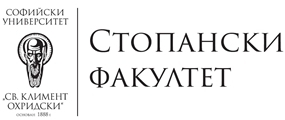09.05.2018
|
|
|
Представителството на Международния валутен фонд в България и Стопанският факултет на СУ "Св. Климент Охридски" организират съвместно представяне на доклада
IMF Spring 2018 Regional Economic Outlook:Europe – Managing the Upswing in Uncertain Times
на 23 май 2018 г. (сряда) от 10.00 до 11.45 ч в Аулата на СУ "Св. Климент Охридски (София 1504, бул. "Цар Освободител" N 15).
Събитието ще се проведе на английски език, със симултанен превод.
За регистрация, моля свържете се с г-жа Иглика Василева, МВФ: ivassileva@imf.org до края на деня на 22 май 2018 г.
Програма на събитието:
|
10:00 – 10:10 | Opening Remarks Assoc. Prof. Atanas Georgiev, PhD, Vice-Dean of the Faculty of Economics and Business Administration (FEBA), Sofia University "St. Kliment Ohridski" Alejandro Hajdenberg, IMF Resident Representative in Bulgaria and Romania |
|
10:10 – 10:40 | Conjunctural chapter: Managing the Upswing in Uncertain Times Presenter: Sylwia Nowak, Senior Economist, IMF European Department |
|
10:40 – 11:10 | Thematic chapter: European Wage Dynamics and Labor Market Integration Presenter: Faezeh Raei, Economist, IMF European Department |
|
11:10 – 11:45 | Discussion Discussants:
|
Допълнителна информация:
Abstract
Europe continues to enjoy strong growth, which is firming up in many countries. The forecast is for growth to stay robust, at least in the near term. However, there are several risks on the horizon. Policymakers should seize the moment and push forward with reforms to increase growth potential and rebuild buffers that could support growth in case of negative shocks.
Despite the strong growth momentum, inflation and wage growth remain subdued in most advanced economies in Europe. In contrast, wages are growing rapidly in Central and Eastern Europe, potentially affecting their competitiveness and risking higher inflation. Why are wages not increasing in many European advanced economies, and what will it take for them to pick up noticeably? Is there something that can be learned from the economies where wages are growing rapidly?
About the Presenters
Ms. Sylwia Nowak is a senior economist in the Emerging Economies Unit of the IMF’s European Department, where she co-authors the Regional Economic Outlook for Europe. Since joining the IMF in 2009, Sylwia has worked on the Global Financial Stability Report; Regional Economic Outlook for the Asia-Pacific region; and country assignments in Asia, Europe, and South America. In 2015–2017, she was involved in creating the new enterprise risk management framework at the Fund, with lead responsibilities for design of innovative risk methodologies and strategic assessment of the risks the IMF faces. Her research interests include financial econometrics, forecasting, and empirical market microstructure. Sylwia has a Ph.D. in Financial Econometrics and an M.S. in Applied Statistics from the Australian National University in Canberra, Australia.
Ms. Faezeh Raei is an economist in the Emerging Europe Unit of the IMF’s European Department. Since 2014 she has been the co-author of many Regional Economic Outlook (Issues) reports on Europe and Central and Eastern and Southeastern Europe. Prior to that she worked on a range of advanced, emerging, and low income countries. Her recent research covers macrostructural issues, labor markets, migration, and supply chains. Faezeh holds a Ph.D. in Economics and a M.A. in Mathematics from the University of Texas at Austin.


